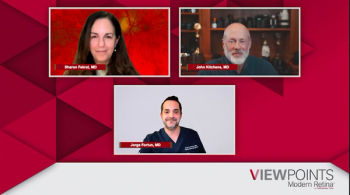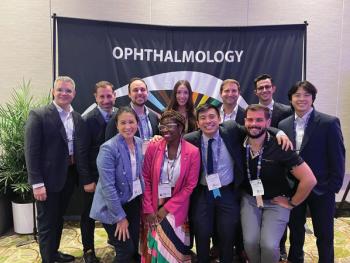
Long-lasting vision improvement linked to treatment for retinal vein occlusion, NEI study finds
According to the study, many patients with retinal vein occlusion maintain visual acuity gains above baseline at five years, but they require long-term monitoring and treatment.
In a study funded in part by the National Eye Institute, a team of investigators found that a treatment for retinal vein occlusion yields long-lasting vision gains, with visual acuity remaining significantly above baseline at five years. However, many of the patients require ongoing treatment.
Retinal vein occlusion is one of the most common blinding conditions in the United States. Without treatment, central retinal vein occlusion (CRVO), the most severe type of retinal vein occlusion often leads to significant and permanent vision loss.
A report on 5-year outcomes of the Study of Comparative Treatments for Retinal Vein Occlusion 2 (SCORE2) (NCT01969708), was published April 21 in American Journal of Ophthalmology.1 SCORE2 was funded in part by the National Eye Institute (NEI), a part of the National Institutes of Health.
According to an NEI news release, retinal vein occlusion is caused by a blockage of the veins carrying blood away from the retina. The blockage can lead to macular edema where fluid becomes trapped within and under the retina, resulting in a significant and rapid loss of visual acuity in the patient. Investigators noted that without treatment, the condition usually results in a permanent loss of vision. The most effective treatment, injections of anti-vascular endothelial growth factor (VEGF) drugs, helps control blood vessel leakage and swelling in the retina.
“While anti-VEGF therapy is associated with significant improvement in both retinal swelling and visual acuity in patients with central or hemi-retinal vein occlusion, our findings show that most of the patients followed still required treatment to control the macular edema for at least five years,” Ingrid U. Scott, MD, MPH, Penn State College of Medicine, Hershey, chairperson of the study, said in the NEI news release. “This demonstrates the importance of continued monitoring of these patients.”
NEI noted in its release that in the SCORE2 clinical trial, investigators reported that two types of anti-VEGF treatment were equally effective at improving visual acuity in people with macular edema due to CRVO or hemi-retinal vein occlusion (HRVO). CRVO affects the entire retina, while HRVO generally affects about half of the retina. Half of the study participants had been given Avastin (bevacizumab) while the other half received Eylea (aflibercept). Both drugs were administered by injection once per month for 6 months. At the 6-month mark, the vision of participants in both groups had, on average, improved over 3 lines.
Moreover, the investigators detailed in the report following SCORE2 participants for 5 years, collecting information about their visual acuity, treatments, and whether their macular edema had resolved. After the initial 12-month study period, participants in the study were treated at their physician’s discretion. Most physicians reduced the frequency of anti-VEGF injections and some switched their patients to the other anti-VEGF drug. At 5 years, many participants had lost some visual acuity when compared to their acuity at the 12-month mark; however, they retained on average 3 lines of improvement, compared to their acuity at the beginning of the study.
Michael Ip, MD, co-chairperson of the study from Doheny Eye Institute, University of California Los Angeles, pointed out that investigators were surprised to find that despite many participants still needing treatment after 5 years, their visual acuity outcome remained very good.
“In comparison to this treatment for wet age-related macular degeneration, where initial vision improvements fade over time, these results are quite favorable,” Ip said in the news release.
Scott added that the 5-year study tells us a lot about what’s happening with retinal vein occlusion patients in the real world.
“Prior to this study, retinal vein occlusion was widely considered an acute illness,” Scott said. “This study shows that RVO is a chronic disease. It also underscores the importance of disease monitoring and individualized treatment to achieve the best possible vision.”
The SCORE2 study was funded by NEI and Research to Prevent Blindness. Study drugs were provided by Regeneron Inc and Allergan Inc.
Reference
1. Scott IU, VanVeldhuisen PC, Oden NL, Ip MS, Blodi BA, for the SCORE2 Investigator Group. “Month 60 Outcomes after Treatment Initiation with Anti-VEGF Therapy for Macular Edema due to Central or Hemi-Retinal Vein Occlusion.” American Journal of Ophthalmology. April 21, 2022 https://doi.org/10.1016/j.ajo.2022.04.001
Newsletter
Keep your retina practice on the forefront—subscribe for expert analysis and emerging trends in retinal disease management.











































